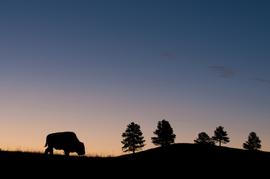PAUL GRUCHOWíS LEGACY
Paul Gruchow has been called our contemporary Thoreau.
In his book, THE NECESSITY OF EMPTY PLACES, Paul wrote: "There is no
death so final as the death of a memory." When asked several months before his death,
at age 56 -- a suicide born of depression Ė how he wanted to be remembered, he replied:
"Tell them I got up and said a few words."
His death, although a tragedy, is not so final as the death of our remembering him
would be. He got up and said more than a few words, his enduring gift to us in
these confusing, angst provoking times.
In remarkably lyrical essays, he described, argued, cajoled, reflected, intoned,
implored, praised, evoked, and sang. But most of all, he shared his soul: His great love
for small, rural communities and his upper midwestern roots; his discovery
of the tall grass prairie and the mountains of the American West; his canoe trips into
the northern Minnesota wilderness; his struggles with childhood trauma, depression
and the mental health treatment system.
His greatest virtue is his generosity to all of us: The thousands of words he has
left behind in six published books and hundreds of speeches, his personal journal,
and several unpublished manuscripts.
|
.
Paul Gruchow was raised on a small, subsistence farm near Montevideo, Minnesota.
He is the author of six published books on subjects ranging from the culture of
the tall grass prairie to what we teach (and fail to teach) rural children -- work
widely acclaimed for its lyrical prose and eloquence A respected and inspiring
educator, Paulís writer in residence involvements included St. Olaf and Concordia
College, The University of Minnesota, The Lake Superior Studies Program, as well
as lectures and workshops in public schools, churches, bookstores, government and
environmental organizations. He has won both the Minnesota Book and Lifetime
Achievement Awards, served on the board of The National Endowment For The Humanities,
and in the 1980ís edited THE WORTHINGTON GLOBE -- an award winning newspaper.
His unpublished work includes several natural history manuscripts, a personal journal,
numerous lectures, poetry, fiction, and a compelling memoir exploring his struggle
with depression and the mental health treatment system. Paul took his own life in
Duluth, Minnesota on February 22, 2004, at the age of 56.
|
ELEGY FOR PAUL GRUCHOW
Youíve been gone one week
wandering a remnant of prairie
crossing the still frozen lakes
of Minnesota
your snow shoe tracks disappearing
and no one can find you.
This morning I woke in pain
needing to hear your voice.
You arenít coming back, old friend.
There is no return address
no way to reach you with a question:
How will we survive a time
in which even one brave as you
could not stop his hands
from shaking at a lectern?
I miss most your laughter -
how you held back nothing
your whole body convulsing
when we watched that movie
about the psychiatrist
driven mad by his patient -
how you writhed on the floor
in pure cathartic delight.
Today there are no words from you
but I will go on listening still,
this large silence your eloquence now.
Louis Martinelli
.
|
 |
| photo by John Duren |
|
|
 |
| photo by John Duren |
|
| SLEEPING IN THE WILDERNESS
For Paul Gruchow
The sound of rain on the asphalt roof
This morning, the last day of January,
Reminds me of when you said
You loved to hear the rain on your tent
Sleeping in the wilderness
And of how a man in the audience
Said you were wrong to love it
Because "that rain will still be there
In the morning"
I no longer remember your answer.
I remember that Sigurd Olson
Wrote in The Singing Wilderness
About the peace of lying down
In a strong tent, ax nearby,
Should anything snap in the storm
During the night.
I donít know why your tent broke
Or how to feel about the sound of the rain
Above me now.
I only know that you are
Past caring, Sleeping in the wilderness, alone.
Loren Gustafson
|
|